Related Research Articles
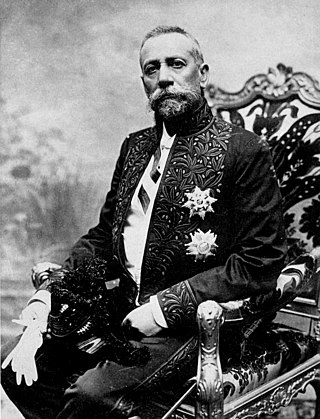
Albert I was Prince of Monaco from 10 September 1889 until his death in 1922. He devoted much of his life to oceanography, exploration and science. Alongside his expeditions, Albert I made reforms on political, economic and social levels, bestowing a constitution on the principality in 1911.

Princess Antoinette, Baroness of Massy was a member of the princely family of Monaco. She was the elder sister of Prince Rainier III. Her parents were Princess Charlotte, Duchess of Valentinois and her former husband, Count Pierre de Polignac.
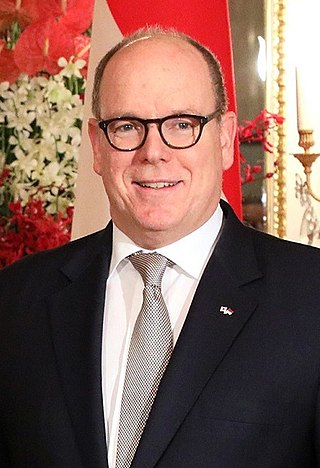
Albert II is Prince of Monaco, reigning since 2005.

The Oceanographic Museum is a museum of marine sciences in Monaco-Ville, Monaco. This building is part of the Institut océanographique, which is committed to sharing its knowledge of the oceans.
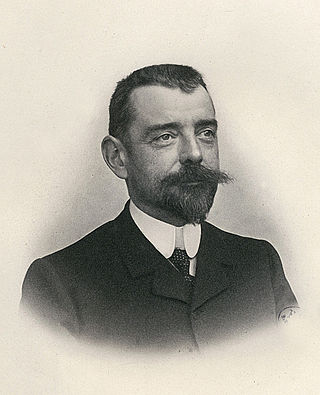
Louis Marie Adolphe Olivier Édouard Joubin was a professor at the Muséum national d'Histoire naturelle in Paris. He published works on nemerteans, chaetognatha, cephalopods, and other molluscs.
The Alexander Agassiz Medal is awarded every three years by the U.S. National Academy of Sciences for an original contribution in the science of oceanography. It was established in 1911 by Sir John Murray in honor of his friend, the scientist Alexander Agassiz.
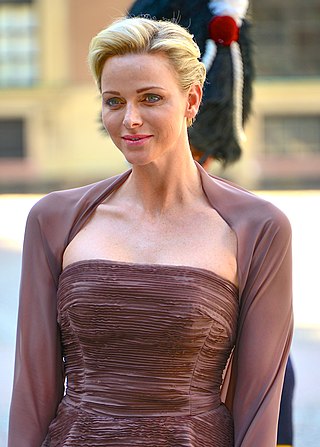
Charlene is Princess of Monaco as the wife of Prince Albert II. Before her marriage, Charlene was an Olympic swimmer representing South Africa.
There are four orders of Monaco. These are:
Carl Wunsch was the Cecil and Ida Green Professor of Physical Oceanography at the Massachusetts Institute of Technology, until he retired in 2013. He is known for his early work in internal waves and more recently for research into the effects of ocean circulation on climate.
Lynne Talley is a physical oceanographer at Scripps Institution of Oceanography known for her research into the large-scale circulation of water masses in the global ocean.
Klaus Wyrtki was an American physical oceanographer.
Harry Leonard Bryden, FRS is an American physical oceanographer, professor at University of Southampton, and staff at the National Oceanography Centre, Southampton. He is best known for his work in ocean circulation and in the role of the ocean in the Earth's climate.

The Military Karl-Friedrich Merit Order was a military order of merit of the Grand Duchy of Baden. Established 5 October 1805 by Charles Frederick, Elector and later Grand Duke of Baden, the order recognized outstanding military merit amongst military officers. In 1807, medals associated with the order were added as the highest awards for bravery for non-commissioned and enlisted soldiers.
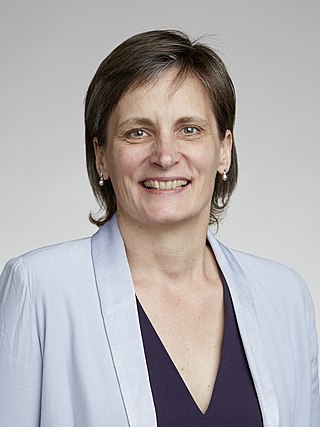
Marie Corinne Lyne Le Quéré is a Canadian scientist. She is Royal Society Research Professor of Climate Change Science at the University of East Anglia and former Director of Tyndall Centre for Climate Change Research. She is the chair of the French High Council on Climate and member of the UK Climate Change Committee. Her research focuses on the interactions between the carbon cycle and climate change.

Robert Calcagno born 26 June 1960 is a Monegasque politician and leader who is CEO of the Oceanographic Institute Foundation Albert I, Prince of Monaco. Robert Calcagno has held ministerial posts in the government of the Principality of Monaco between 2006 and 2009. He now leads the Oceanographic Museum of Monaco and the Maison des océans in Paris His commitment to the protection of the oceans, to a better balance between Humankind and Nature and, on a broader level, his involvement in the economic, social and international life of the Principality of Monaco, have made him one of the key players in the policies of H.S.H. Prince Albert II of Monaco.

Trevor John McDougall is an Australian physical oceanographer specialising in ocean mixing and the thermodynamics of seawater. He is Emeritus Scientia Professor of Ocean Physics in the School of Mathematics and Statistics at the University of New South Wales, Sydney, Australia, and is Past President of the International Association for the Physical Sciences of the Oceans (IAPSO) of the International Union of Geodesy and Geophysics.
The Institut océanographique is an ocean education organization based in Monaco. The institute manages two ocean museums and lobbies globally for the preservation of the oceans' ecology.

The Institut océanographique de Paris, is an oceanographic institution founded in 1906 by Albert I, Prince of Monaco, which also includes the Oceanographic Museum of Monaco. The building was designated as a Monument historique in 2004. In 2011, for the 100 year anniversary, it was renamed the Maison de l'Océan.

International Association for the Physical Sciences of the Oceans (IAPSO) is one of eight associations of the International Union of Geodesy and Geophysics (IUGG), constituted within the International Science Council (ISC). It was founded in 1919 as an oceanographic section of the IUGG and renamed an association in 1931. IAPSO is the primary body responsible for maintaining and improving oceanographic standards and practices. The President of IAPSO is Dr. Hans van Haren.
References
- ↑ Journal de Monaco
- ↑ Prince Albert I Medal Prince Albert I Medal Recipients
- ↑ "Arnold Gordon to Receive Prince Albert I Medal". Department of Earth and Environmental Sciences, Columbia University. Retrieved 2013-10-27.